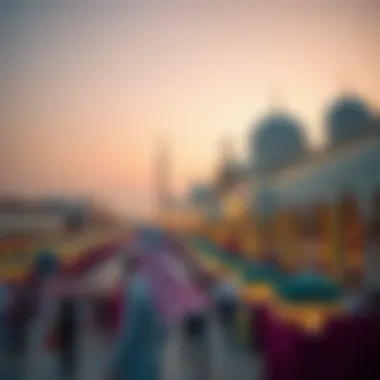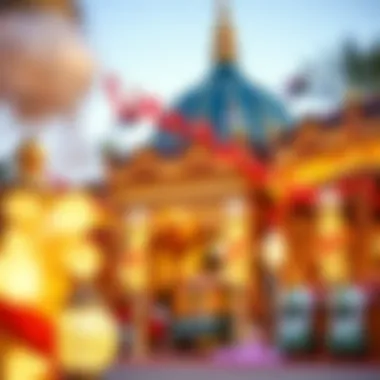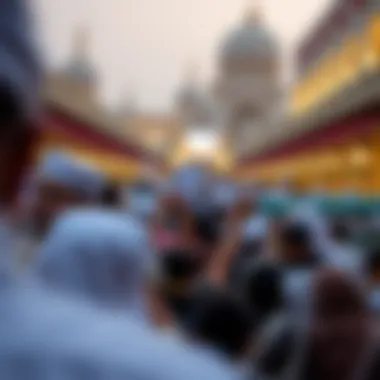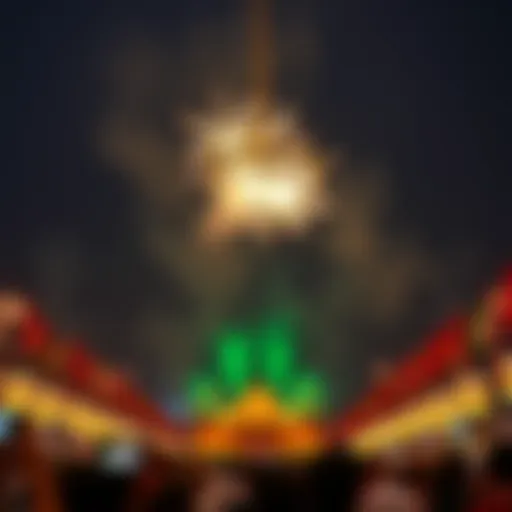Exploring UAE Holidays in 2023: Insights and Trends


Intro
The United Arab Emirates (UAE) has an intriguing patchwork of holidays that reflect its rich cultural tapestry, blending tradition with modernity. Each holiday carries its weight of significance, not just in cultural practice but also in economic activities, especially within the real estate sector. Understanding these holidays is essential for investors, homeowners, agents, and analysts alike, as they can directly impact business operations, the social landscape, and the tourism sector.
In 2023, the holidays present not only an opportunity for celebration but also for economic activity and investment. As people gather to mark these special occasions, the flow of traffic to commercial spaces increases, and the holiday spirit seems to stir the market's potential to thrive. Imagine the bustling streets and the vibrant atmosphere; this is where opportunity knocks. Investors looking to capitalize on trends in property investments can gain deeper insights from the patterns and practices tied to these holidays.
This article delves into the public holidays in the UAE for 2023, shedding light on their cultural significance and the resultant impact on real estate dynamics. By dissecting these elements, we aim to equip readers with knowledge that goes beyond mere dates on a calendar, transforming holidays into strategic assets in business and investment planning.
Let’s begin by exploring the Market Trends that are interwoven with these festive occasions.
Intro to Holidays in the UAE
Public holidays in the United Arab Emirates (UAE) hold a significant place in the cultural, economic, and social fabric of the nation. They are not merely days off but serve as opportunities for citizens and expatriates alike to engage in communal activities, uphold traditions, and reflect on the values that shape the society. In this context, understanding the holidays provides pivotal insights for investors, homeowners, agents, and analysts as they navigate the UAE's dynamic landscape.
Historical Context
Tracing back to the heart of the UAE's history, holidays often have roots in Islamic traditions and significant historical milestones. For instance, Eid Al-Fitr, marking the end of Ramadan, has been celebrated for generations, reflecting the resilience and faith of the Muslim community in the region. Another key holiday, National Day, celebrates the unification of the seven emirates and is a symbol of the UAE's journey from a collection of distinct tribes to a unified nation.
While these celebrations have evolved over the years with modernization, they remain steeped in the rich tapestry of local heritage. As such, these holidays serve as reminders of the enduring spirit and collective memory of the people who have inhabited this land, fostering a sense of belonging and identity.
Current Significance
In contemporary society, holidays in the UAE have transcended their original religious and historical significance to become a cornerstone of the social and economic agenda. They act as catalysts for economic activity, spurring trends in tourism and retail sectors, while also setting the stage for community gatherings. Local businesses typically tailor their promotions and events around the holidays, creating an environment robust with activity.
The interplay of culture and economy during holiday periods illustrates the UAE's unique position as a melting pot of traditions and modernity.
Furthermore, the holidays play a poignant role in promoting social cohesion. They encourage interactions among diverse communities, fostering mutual respect and understanding. For real estate investors and analysts, these periods offer critical insights into seasonal market fluctuations and consumer behavior, which can inform strategic decisions.
Ultimately, the significance of holidays in the UAE is multi-faceted. They represent not only a time for celebration but also a reflection of the country's growth, unity, and cultural richness. As we move forward, recognizing the impact and relevance of these holidays will remain crucial for anyone looking to engage meaningfully within this vibrant society.
Overview of Public Holidays in
Public holidays in the UAE carry significant weight in the cultural and social fabric of the nation. These occasions not only provide time for individuals to step back from their daily grind but also function as anchors of cultural identity, tying citizens and residents to their rich heritage and religious values. In 2023, understanding these holidays goes beyond the surface; it offers insights into market behavior, tourism spikes, and local customs that define life in the UAE.
List of Key Holidays
In 2023, the UAE's calendar is dotted with a number of remarkable public holidays:
- Eid Al-Fitr – Celebrated at the end of Ramadan, this holiday is marked by joy and community gatherings.
- Eid Al-Adha – Known as the "Festival of Sacrifice," this day commemorates one of the most significant events in Islamic faith and involves charitable acts.
- National Day – It marks the unification of the emirates in 1971 and is celebrated with fervor across the nation.
- Commemoration of the Martyrs – A day to honor those who have given their lives for the UAE, fostering a deep sense of pride and respect.
- Islamic New Year – A time for reflection and celebration in the new lunar year.
- Prophet Muhammad’s Birthday – This day is distinguished by religious observances honoring the life and teachings of the Prophet.
These holidays, both religious and national, provide meaningful moments for people to gather, celebrate, and reflect on their identities.
Official Government Announcements
The UAE government typically announces public holidays well in advance, signaling their importance in planning for individuals and businesses alike. These announcements are usually made through various official channels such as
- UAE Government Websites
- Social Media
- Press Releases
They clarify how long the holidays will last, which can be especially beneficial for businesses in adjusting staffing and operational hours. Moreover, the timing of these holidays can affect sectors like hospitality and retail.
For instance, Eid holidays are often extended, allowing for a longer period of celebration and travel, directly influencing tourism and real estate demand. The clearance of such announcements provides clarity on holiday dates, enabling people and businesses to strategize accordingly.
"The importance of official announcements cannot be overstated; they serve as a guiding light for both residents and businesses in the UAE."
Understanding these elements not only helps in appreciating the cultural landscape of the UAE but also assists in predicting potential trends in consumer behavior during these significant periods.
Eid Al-Fitr
Eid Al-Fitr is one of the most significant festivals in the Islamic calendar, marking the end of Ramadan, a month of fasting, prayer, and reflection. This joyous occasion has profound cultural importance in the United Arab Emirates and throughout the Muslim world. Celebrated with much fanfare, Eid Al-Fitr fosters community bonding and family gatherings, making it essential not just as a religious observance, but also as a reflection of the social fabric of UAE society.
Cultural Importance
Eid Al-Fitr embodies gratitude and generosity. It signifies the completion of Ramadan, a month during which Muslims fast from dawn until sunset, seeking spiritual growth. The festival serves as a reminder of humility and the importance of sharing one’s blessings with those less fortunate. In the UAE, it fosters cultural cohesion across its diverse population, with expatriates and locals participating in the festivities together.
Traditionally, the day begins with a special prayer, known as Taraweeh, held in mosques and open areas across the country. People don their finest clothes, often new or freshly cleaned, symbolizing new beginnings. There’s a rich tapestry of cultural practices unique to various families and communities, showcasing a blend of Emirati heritage and expatriate traditions.
Celebration Practices


Eid Al-Fitr celebrations can be quite elaborate:
- Gatherings: Families come together to break their fast and share meals, serving sumptuous feasts that include dishes like kibbeh, baklava, and the traditional sheer khurma, a sweet vermicelli dish.
- Charitable Acts: It is customary to give Zakat al-Fitr, a form of charity aimed at helping the needy before the Eid prayer, reinforcing the importance of compassion.
- Cultural Activities: Various events are organized, which may include firework displays, art exhibitions, and cultural performances, reflecting a blend of local and international influences.
- Gifting: Exchanging gifts among families and friends is common, as is giving children's money, known as Eidiyah, which grants them a sense of participation.
Each community may add its flavor to the festivities, with some practicing unique traditions that highlight their heritage, often leading to a vibrant mix of customs.
Impact on the Property Market
The impact of Eid Al-Fitr on the UAE property market is multi-faceted. As families come together to celebrate, many choose to invest in their homes, often making improvements or spending on renovations. Property demand tends to increase during this time, attributed to a festive spirit and the desire for a lively, welcoming environment.
"Holidays such as Eid Al-Fitr not only influence personal spending habits but also reflect broader economic trends that investors must be aware of."
Furthermore, the celebration spurs increased retail activity, prompting both consumers and businesses to refurbish their spaces or expand physical presence, which can influence property leases and real estate prices. In some cases, landlords can expect a rise in rental inquiries as people seek short-term housing options to accommodate visiting family members during the holiday season.
Successful investors can leverage this seasonal demand by focusing on properties in prime locations that offer easy access to festivities and community activities.
In summary, Eid Al-Fitr is not merely an event marked by rituals and gatherings; it plays a significant role in shaping the cultural and economic landscape of the UAE. Understanding its importance provides crucial insights into potential investment and development opportunities within the property sector.
Eid Al-Adha
Eid Al-Adha, often recognized as the "Festival of Sacrifice," is one of the most profound Islamic holidays celebrated in the United Arab Emirates and across the world. Its importance transcends the mere act of celebration, further interweaving with the cultural, social, and economic fabric of the UAE. This festival holds great significance, affecting various aspects, including investment opportunities and tourism dynamics. Understanding Eid Al-Adha helps investors and residents alike to navigate activities and trends associated with this time.
Significance in Islamic Tradition
Eid Al-Adha commemorates the willingness of Ibrahim (Abraham) to sacrifice his son Isma’il (Ishmael) in obedience to God's command. This pivotal biblical narrative underscores themes of faith, obedience, and devotion. Muslims perform a special prayer (Salat) in the morning, followed by the ritual of Qurbani, where an animal such as a sheep, goat, or cow is sacrificed, symbolizing Ibrahim’s submission to divine will.
This act of sacrifice not only has substantial religious significance but also embodies communal support, as a portion of the meat must be distributed to those in need, reinforcing social ties and compassion within the society. In the UAE, the day is marked by a sense of unity and reflection and serves to strengthen the community bonds that hold the country together.
Modern Celebrations
In contemporary times, celebratory practices during Eid Al-Adha have evolved. Families gather for large meals that feature traditional dishes, often reflecting both Emirati cuisine and cultural influences from across the Arab world. Cities like Dubai and Abu Dhabi host various events including concerts, fireworks, and cultural exhibitions, enticing locals and tourists alike.
Furthermore, the festive atmosphere transforms public spaces into vibrant venues filled with joyful activities. Shopping malls offer sales and events that are exclusive to the holiday season, prompting citizens and residents to indulge in retail therapy, thereby stimulating the local economy. Here, the blending of tradition and a modern lifestyle showcases how Eid Al-Adha continues to adapt while honoring its roots.
Real Estate Trends During Eid
The real estate market in the UAE experiences considerable shifts during Eid Al-Adha. While family gatherings and festivities dominate personal activities, many property developers capitalize on this holiday period to launch new projects or hold special events that attract potential investors and buyers. This often coincides with heightened consumer interest as deals and property showcases tend to be more appealing during festive seasons.
Historically, Eid periods have seen an uptick in property viewings and transactions. The holiday acts as a catalyst for many who are considering investing in real estate, often leading to increased inquiries and consequently higher sales in residential properties. Additionally, with a substantial influx of tourists during Eid Al-Adha, there is a notable demand for vacation rentals and short-term housing, which also benefits property owners looking to maximize earnings.
"Eid Al-Adha represents not just a time for festivities, but also a point of reflection for real estate dynamics in the UAE. It's where culture meets opportunity."
National Day
National Day in the UAE holds a special place in the hearts of both citizens and expatriates alike. Celebrated annually on December 2nd, this day marks the union of the seven emirates and the foundation of the UAE in 1971. It represents not just a historical milestone but also embodies the aspirations and dreams of a nation that has grown remarkably in a relatively short period. The significance of National Day lies in its ability to bring together the rich heritage of the emirates while also highlighting the rapid development and modernization that has occurred since their unification.
Historical Significance
The history of National Day is intertwined with the broader narrative of the UAE's formation. Prior to the unification, the emirates were separate entities, each with its own leadership, customs, and resources. The effort to form a cohesive nation was fueled by the vision of leaders such as Sheikh Zayed bin Sultan Al Nahyan, who believed in the power of unity and cooperation. This cooperation led to the signing of the UAE Constitution and the establishment of a federal system of governance. The historical significance of this day is not just in remembering when the emirates became one, but also in recognizing the persistent efforts of those early leaders who fostered unity and cooperation among diverse cultures. It reflects the deep-rooted values of tolerance and respect that continue to define the UAE today.
Festivities and Events
Celebrations on National Day are vibrant and diverse, bringing the country to life in an array of colors and festivities. Streets are adorned with flags, lights, and decorations, creating an atmosphere of patriotism and joy. Many local communities organize parades that showcase traditional music, dance, and cultural performances. The grand celebrations kick off with a spectacular fireworks display that lights up the night sky, captivating both locals and tourists.
"National Day is not just a holiday; it’s a vivid expression of pride and belonging for everyone in the UAE."
Folk art shows and exhibitions tell stories of the UAE's past, and modern carnival-like events captivate younger generations, encouraging them to take pride in their heritage. There are also numerous public speeches, and community gatherings that underscore the importance of national identity and unity. Additionally, special events are hosted at key landmarks, making it a memorable occasion for all participants, young and old.
Effects on Economic Activities
The economic impact of National Day extends far beyond mere celebrations. This holiday serves as a catalyst for economic activities across various sectors. In the lead-up to National Day, there is a notable spike in consumer spending as residents and tourists alike indulge in shopping for decorations, gifts, and food. Retail outlets often launch special promotions, ensuring that citizens can partake in the festivities without breaking the bank.
Moreover, the tourism sector sees a handsome boost, with visitors flocking to the UAE to experience the festive atmosphere. Hotels, restaurants, and leisure activities receive a surge in bookings, further stimulating the local economy.
Property markets often feel the ripple effects too, as festive events lead to greater foot traffic in commercial areas, encouraging potential tenants and buyers to explore investment opportunities. Businesses often use this chance to enhance their visibility, capitalizing on the increased traffic.
In summary, National Day in the UAE marries cultural festivity with economic dynamism, creating an occasion that is as productive as it is celebratory. As the country continues to evolve, both the celebrations and the economic implications of National Day remain crucial to understanding the vibrant and ever-adapting landscape of this remarkable nation.
Commemoration of the Martyrs


The Commemoration of the Martyrs, observed annually on November 30th in the UAE, stands as a solemn reminder of the sacrifices made by the nation’s brave men and women. This day serves to honor those who have given their lives for the unity and safety of the country. Its significance extends beyond mere remembrance; it's intertwined with national identity and pride, shedding light on the values that uphold the UAE's integrity and resilience.
Understanding the Day's Purpose
The Commemoration of the Martyrs is not just a day on the calendar; it embodies the spirit of unity among the citizens of the UAE. The purpose of this day is to foster respect and gratitude for the sacrifices made in service to the nation. Key activities include:
- National ceremonies held at various locations, particularly at the Martyrs' Memorial in Abu Dhabi. Here, the country's leaders often lead the ceremonies, reflecting the high regard in which the lives lost are held.
- Cultural activities that bring communities together to engage in traditional practices. This helps reinforce the values of courage and dedication, and honors the legacy of the martyrs.
- Education initiatives are conducted to enlighten younger generations about the significant contributions of these individuals. This ensures that the memory of the fallen is passed down, securing a deep-rooted consciousness about national pride.
The day fosters a collective spirit, urging all UAE citizens to take a moment, reflect, and unify in respect for those who have made the ultimate sacrifice.
Forms of Remembrance and Respect
Various traditions mark the Commemoration of the Martyrs, each fostering a profound sense of regard and gratitude. Here are some notable forms of respect demonstrated across the UAE:
- Two minutes of silence: At 11 AM on November 30th, a nationwide moment of silence is observed, providing an opportunity for reflection and remembrance. This practice is profound; the stillness echoes the respect felt by the nation.
- Lighting the Burj Khalifa: The iconic Burj Khalifa often lights up in the colors of the UAE flag, symbolizing unity and pride in the sacrifices made for the nation's freedom and stability.
- Visiting cemeteries: Many families visit the gravesites of their loved ones who fell during their service, bringing flowers and offering prayers. This personal connection underscores the emotional significance behind this occasion.
- Social Media Tributes: Citizens take to social media to share stories, photos, and messages of respect. Such activities help to spread awareness and encourage collective participation in the remembrance process.
"To remember our martyrs is to honor our future, for their sacrifices paved the path of our prosperity."
Islamic New Year
The Islamic New Year, known as Hijri New Year or Muharram, holds deep significance within Islamic culture and is recognized widely in the United Arab Emirates. This holiday marks the start of the Islamic lunar calendar, representing not just a shift in chronology, but also a moment for reflection and personal growth. For investors, homeowners, agents, and analysts alike, understanding this holiday's influence can reveal valuable insights into the cultural fabric of the UAE, helping to navigate the socio-economic landscape more effectively.
Cultural Practices Surrounding the New Year
Culturally, the Islamic New Year is a quieter occasion compared to other holidays like Eid, but it carries its own weight of customs and traditions. Families gather to reflect on the past year, often sharing meals that include special dishes such as sheer khurma—a dessert made from vermicelli, milk, and dates. There’s a focus on reconnecting with relatives and friends, strengthening the bonds that hold communities together.
- Reflection and Prayer: Many individuals use this time to engage in prayer and seek spiritual renewal, attending mosques for special sermons.
- Cultural Events: Cultural programs or gatherings may happen in public parks, showcasing Emirati music, dance performances, and poetry readings that honor the essence of this day.
- Charity: Acts of charity are quite significant. People are encouraged to contribute to charitable causes, reflecting the Islamic principles of generosity and kindness.
Though not a public holiday in the same vein as Eid, the sense of community during the Islamic New Year cultivates a rich cultural tapestry, making it an integral part of the UAE's societal landscape.
Influence on Business Operations
The Islamic New Year casts a notable shadow over business operations, prompting unique shifts in dynamics for various sectors. For those in real estate, retail, and hospitality, awareness of how this period unfolds is crucial for strategic planning.
- Market Slowdown: Many businesses experience a dip in customer footfall as people focus on family time rather than shopping. A well-planned approach can help mitigate potential losses during this quieter season.
- Strategic Promotions: On the flip side, some retailers take advantage of this reflective period to run campaigns that align with themes of new beginnings and personal growth, enticing buyers who are in a motivational mindset.
- Workplace Considerations: Companies may adopt flexible working hours to accommodate employees’ wishes for personal observance, impacting productivity levels temporarily.
"Understanding the nuances of cultural holidays like the Islamic New Year allows businesses to adapt and thrive even in less busy times."
Overall, the Islamic New Year offers a blend of cultural appreciation and strategic considerations for businesses operating within the UAE. By engaging with the local customs and recognizing the shifts in operational patterns, stakeholders can navigate this period successfully.
Prophet Muhammad’s Birthday
The observance of Prophet Muhammad’s Birthday, known as Mawlid, holds immense weight not just in a religious context, but also in the cultural fabric of the UAE. This date serves as a reminder of the teachings and life of the Prophet Muhammad. Many Muslims consider it a day of joy and reflection, presenting an opportunity to delve into Islamic history and deepen one's spiritual connection.
Religious Significance
The birthday of the Prophet Muhammad is celebrated on the 12th day of Rabi' al-Awwal, the third month in the Islamic calendar. This event signifies more than just a historical moment; it embodies the essence of compassion, mercy, and guidance. For many believers, commemorating this day is about acknowledging the profound influence of the Prophet's teachings on their lives and communities.
The significance is not merely a matter of tradition; it serves as a reminder of moral values and ethical conduct, which the Prophet advocated throughout his life. These teachings continue to inspire millions, making this day a poignant occasion for introspection and communal bonding. For instance, many families gather to share meals, recite poetry about the Prophet, or engage in discussion about his teachings.
Observances and Practices
Observations of Mawlid can vary widely across different communities in the UAE, reflecting local customs and practices. Common traditions include:
- Prayer and Reflection: Many begin the day with prayers, expressing gratitude and seeking blessings. Mosques often hold special sermons recounting the Prophet’s life, inviting worshippers to reflect upon his teachings.
- Community Gatherings: Families and friends frequently gather to celebrate together, sharing traditional dishes and sweets. It’s not uncommon for individuals to pass out food to those less fortunate, emphasizing the prophetic message of generosity.
- Cultural Events: Across various emirates, public events featuring poetry recitals, historical lectures, and religious music take place. These events not only serve to educate but also entertain, forging a deeper bond among attendees.
By celebrating Mawlid, people in the UAE are not only honoring the Prophet but enriching their communities through shared values of peace and unity. This communal aspect reinforces ties that transcend individual beliefs and practices, bringing together diverse populations under a shared admiration for the teachings of Islam.
"Mawlid serves as a beacon of light, guiding the faithful towards deeper understanding and coexistence.”
In summary, the celebration of the Prophet Muhammad’s Birthday is a profound blend of spiritual appreciation and community bonding in the UAE. It’s a day where reflection meets celebration, underscoring the relevance of the Prophet's teachings in contemporary life.
Holidays and Real Estate Market Dynamics
The relationship between holidays and the real estate market in the UAE presents an interesting exploration, intertwining the cultural practices with economic habits of the region. Holidays in this diverse land not only serve as a time for celebration but also significantly influence property demand, pricing, and even the investment landscape. Understanding these dynamics is essential for investors and property stakeholders looking to maximize opportunities in this fast-paced market.
Holidays and Property Demand
During major holidays, such as Eid Al-Fitr and National Day, there tends to be a notable increase in property demand. This can be attributed to various factors. Firstly, these holidays often coincide with family gatherings and travel, leading many residents and expatriates to look for short-term rentals or holiday homes. According to recent trends, when holidays roll around, people are keen on securing properties that cater not just to their lifestyle but also their festive needs.


Moreover, developers and real estate agents often leverage the high spirits of holidays to launch new projects or promotional campaigns. For instance, open house events are commonly organized during these periods, attracting potential buyers who are more inclined to invest in real estate. The upbeat atmosphere generated during holidays encourages prospective homeowners to take the plunge, with many viewing property purchases as a long-term investment not just for themselves but for future generations.
Market Fluctuations During Holiday Seasons
The seasonal fluctuations in the market are quite apparent, particularly during the holidays. Prices can fluctuate depending on the type of holiday and its significance. For instance, right before Eid Al-Fitr, many property prices may see a slight increase due to heightened demand. Conversely, there may be times when some properties remain stagnant or even decrease in price if buyers are more cautious, often waiting it out until the holiday rush subsides.
It's common to see structures in the market adjusting to the ebb and flow of buyers. Rental yields may shift during these festive times, as landlords capitalize on the influx of tourists and holidaymakers looking for accommodations. Additionally, this influence extends to amenities, with increased demand for properties that offer recreational facilities and easy accessibility to event locations or tourist attractions.
"An investor’s awareness of the implications holidays have on the market can make all the difference in strategy and success."
For more insights into property dynamics during holiday seasons, consider visiting resources like Dubai Land Department or exploring discussions on Reddit.
Travel and Tourism during Holidays
Holidays in the United Arab Emirates are more than just time off work; they represent a vibrant confluence of culture, celebration, and commerce. The significance of travel and tourism during these periods cannot be overstated. Each holiday attracts both local and international visitors, resulting in a unique blend of activities that showcase the UAE’s rich heritage and modern attractions. The influx of tourists during holidays drives economic growth, promotes cultural exchange, and provides a taste of the local lifestyle.
Tourist Attractions and Events
During holidays, the UAE transforms into a playground for visitors of all ages. Attractions are not merely places to see; they become arenas of celebration. Events ranging from fireworks displays in Dubai to cultural festivals in Abu Dhabi draw massive crowds. These moments offer immersive experiences that reflect the diversity of the UAE.
For example:
- Dubai Parks and Resorts holds special holiday events featuring fireworks and themed parades, drawing families looking for entertainment.
- Abu Dhabi's Cultural Heritage Festival showcases Emirati art, music, and cuisine, providing tourists a chance to immerse themselves in local traditions.
- Sharjah Light Festival enchants visitors with stunning light installations illuminating the city's key landmarks.
These attractions often have holiday-specific promotions, making them lucrative not only for tourists but also for local businesses that thrive on the holiday rush.
Impact on Local Businesses
The holiday season acts as a double-edged sword for local businesses. On one hand, it presents immense opportunities for growth; on the other, it comes with challenges that can strain operations. Businesses in sectors like hospitality, retail, and entertainment see a boom in demand during these times.
- Increased Foot Traffic: Retailers often report a surge in customers, with shopping malls bustling with holiday shoppers looking for gifts and experiences.
- Accommodation Demand: Hotels and short-term rentals experience spikes in reservations. This demand often leads to higher rates, benefiting property owners.
- Service Overload: However, the sudden increase in customers can strain staff and resources. Businesses must balance quality service with the need to cater to increased volumes, sometimes causing operational hiccups.
"The holiday period is a double-edged sword—while it can fill our coffers, it also tests the limits of our service capabilities."
— A local hotel manager reflecting on holiday pressure.
Challenges during Holiday Periods
Holidays in the UAE, while celebrated with zeal and flair, often come with their own set of challenges that both residents and visitors navigate. In the midst of festivities, issues like overcrowding, unpredictable traffic, and heightened demands on services can create scenarios that require careful consideration. Understanding these aspects is crucial for investors and homeowners who want to gauge the social dynamics during holiday seasons.
Traffic and Commuting Issues
During major holidays, such as Eid al-Fitr and National Day, road congestion can be quite a head-scratcher. The influx of tourists, combined with families embarking on their travels, creates a perfect storm of traffic jams. The usual commutes that residents endure sometimes metamorphose into lengthy delays.
- Peak Travel Times: Families traveling for larger gatherings can cause mean traffic surges at times typically devoid of it.
- Public Transport Strain: Buses and metros may become packed like sardines during these periods, making it difficult for daily commuters or casual visitors.
- Roadworks and Maintenance: Some roads may not operate at full efficiency due to ongoing construction or maintenance, leading to detours and more stress for drivers.
In essence, if you're someone who travels during holidays, it's wise to leave early or consider alternate routes, especially if avoiding a headache is a priority.
Service Sector Pressures
The hospitality and service sectors experience intensified workloads during holiday periods, and this can lead to both positive and negative outcomes. While businesses benefit from higher customer volume, the sheer demand might stretch their resources thin.
- Staffing Challenges: Restaurants, hotels, and shops often hire seasonal workers to manage the bustling clientele. However, inconsistency in service quality can occasionally disrupt the festive atmosphere.
- Inventory Strains: Retailers might face stock shortages on popular items. For instance, certain traditional sweets or gifts may sell out quickly during Eid, creating a scramble for businesses to keep up with demand.
- Customer Experience Variability: With increased foot traffic, customer service could falter due to the overwhelmed staff trying their best to juggle enthusiastic holiday crowds.
To summarize, while holidays showcase the vibrant culture of the UAE, they also pedal a few challenges that might affect transportation and service quality.
By maintaining awareness of these issues, investors and homeowners can better prepare for the shifts in market dynamics during these festive durations.
Ending
The role of holidays in the UAE is far more than just a time for relaxation or festivity; it's a reflection of its rich cultural tapestry and the rhythms of its thriving economy. Each holiday presents a unique narrative, weaving together threads of tradition and modernity, which not only enriches the lives of residents but also enhances the appeal of the UAE as a global destination.
Summary of Key Points
In this article, we explored several key components regarding the holidays in the UAE for 2023:
- The historical and cultural significance of each public holiday, including Eid Al-Fitr, Eid Al-Adha, and National Day, among others.
- The impact these holidays have on various sectors, particularly real estate and tourism.
- How events surrounding these holidays create opportunities for businesses and investors alike.
The holidays offer valuable insights into the UAE's societal dynamics and consumer behaviors, which are pivotal for stakeholders aiming to navigate property investments or local market trends effectively.
Future Outlook on Holidays in the UAE
Looking ahead, the trajectory of holidays in the UAE is poised to evolve as both a cultural and economic asset. With ongoing developments in urban landscapes and the continuous influx of international visitors, one can anticipate:
- Growth in festive events that cater to a more diverse population, reflecting the nation's multicultural fabric.
- Increased collaboration between local businesses to capitalize on holiday spending trends, thereby stimulating economic growth.
- Enhanced engagement from the government to promote national identity and unity through well-organized celebrations.
The landscape of holidays in the UAE will likely become a tapestry interlacing tradition with innovation, making it essential for investors and stakeholders to remain attuned to these changes. This vigilance will enable informed decisions that harness the full potential of these vibrant holidays, ultimately benefiting both the community and the economy.















